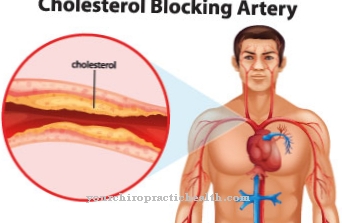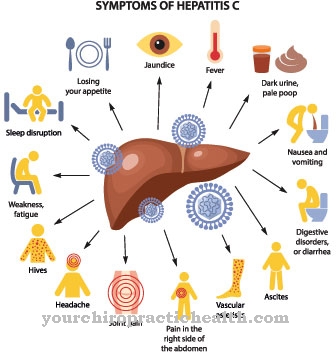A hypertrophy can basically occur in all organs of the human body. However, this phenomenon does not always have to be externally visible when internal organs are affected.
What is hypertrophy?

© Prostock-studio - stock.adobe.com The word hypertrophy is composed of two components. The syllable hyper means over or more, the word part trophein means take in, feed.
In hypertrophy there are physiological, healthy and pathological forms. In any case, hypertrophy is always based on an increase in the volume of tissues. With hyperplasia, the organism reacts to a change in requirements or there are pathological conditions which stimulate forced cell growth.
Under certain physiological conditions, hyperplasia can be combined with tissue reduction. If the trigger for the hyperplasia is missing, the increase in size returns to its original state.
causes
As causes for a Hyperplasia an increased burden on the entire organism or individual special organs as well as hormonal influences are known. Increased performance demands on the physique can cause hypertrophy, which is expressed, for example, in an increase in muscle mass or heart volume.
Female breasts can also enlarge under certain conditions, such as when breastfeeding an infant. However, hypertrophies in organs, which are referred to as pseudo- and compensatory hypertrophy, are not healthy.
Symptoms, ailments & signs
The most important characteristic of hypertrophy is the increase in size of a certain organ due to the enlargement of the corresponding tissue cells. This increase in size can be caused both physiologically and pathologically. Pathological hypertrophies include right heart hypertrophy, left heart hypertrophy, individual forms of muscle hypertrophy, mammary hypertrophy or pyloric hypertrophy.
With right heart hypertrophy mostly unspecific symptoms occur. You may experience dizziness, racing heart, irregular heartbeat or chest pain. A so-called congested liver, edema and neck vein congestion indicate decompensated right heart failure. The main symptom of left ventricular hypertrophy is shortness of breath during exercise.
The symptoms of angina pectoris occur with chest pain and the risk of developing a heart attack. Cardiac arrhythmias and chronic cardiac insufficiency are also common. Muscle hypertrophy is characterized by the increase in the externally visible muscle mass due to muscle training.
However, there are also forms of so-called pseudohypertrophy, in which the skeletal muscle increases in size with a simultaneous loss of strength through muscle breakdown. In certain diseases with muscle breakdown, the actual muscle mass is compensated for by increasing the fat and connective tissue. Breast hypertrophy is an oversized female breast, which can lead to shoulder and back pain due to its mass.
At the same time, there is an incorrect load on the spine. Pyloric hypertrophy, in turn, is characterized by an enlargement of the circular muscles at the stomach outlet. This can lead to constant vomiting, dehydration, weight loss, constipation and a life-threatening metabolic alkalosis.
Diagnosis & course
With a compensatory hypertrophy there is an additional increase in tissue on an organ, which enlarges as a result. The cause of the hyperplasia is a loss of performance in another organ. Its function is taken over and hypertrophy develops. A classic example is the enlargement of the heart valves when there is a heart defect. If a kidney loses function, the remaining excretory organ enlarges to compensate for the deficit.
Pseudohypertrophy is given when growths manifest on individual organs. These growths do not improve the performance of the organ, but simply lead to an increase in volume. These phenomena are usually clearly visible and even palpable. As a rule, these growths, which are characterized by hyperplasia, do not take on any additional tasks.
Depending on the location of a hyperplasia, different diagnostic options are available. In addition to the external and visual assessment, the "inward" looking devices are among the most important tools. In addition to the ultrasound and X-ray-assisted devices, the magnetic resonance and computer tomography are attached. Hypertrophy can also be detected endoscopically.
Complications
In many cases, the hypertrophy is recognized late because there are no direct symptoms or visible changes. In most cases, an organ's tissue enlarges in the patient's body. This enlargement can lead to various complications and complaints. If the hypertrophy occurs in the heart, a heart defect can occur which, in the worst case, leads to death.
If the kidney is affected by hypertrophy, renal insufficiency can occur without treatment, so that the person concerned is dependent on a transplant or dialysis. The victim feels weak and generally ill. Typically, hypertrophy is discovered and diagnosed by accident. There are no complications with the treatment itself. In the case of tumors, chemotherapy is used.
If there is an inflammation, it is fought with the help of antibiotics, whereby the disease progresses relatively quickly. Complications only arise if the hypertrophy remains undetected for a long time and has a negative effect on certain organs. In this case, life expectancy may also be reduced.
When should you go to the doctor?
A doctor should be consulted as soon as the person concerned has a general feeling of illness. The course of the disease of hypertrophy is insidious and is often only noticed late. The symptoms are mostly diffuse and lead to a slow increase in malaise over a long period of time. As soon as the person concerned notices the changes in their health, a doctor's visit is necessary.
If the level of performance declines continuously, if the person concerned experiences an increasing loss of their quality of life or if they can no longer adequately fulfill their usual everyday obligations, a check-up is advisable. A doctor is needed in the event of sleep disorders, internal restlessness or general weakness. If there is an increase in body size despite sufficient exercise and a healthy diet, it is advisable to see a doctor. If a high-calorie diet is not ingested, an increase in body fullness is an indication of a disease that needs treatment.
If there are irregularities in digestion or urination, a doctor should be consulted. If you experience pain, kidney problems or emotional abnormalities, it is advisable to consult a doctor. If the amount of urine changes or if there is an increased need for fluids, a doctor must be consulted. If you have a fever, pressure in the chest, circulatory disorders, or breathing problems, a doctor should examine and treat the symptoms. Without medical care, life-threatening situations can arise.
Doctors & therapists in your area
Treatment & Therapy
Treating a hypertrophy depends on various factors. In the case of hypertrophy, these are its position, the type of tissue cells and the extent. Not all hypertrophies are confined to the heart, but can affect the bones as well.
As a rule, special drugs are used to treat pathological hyperplasia, which can lead to stagnation of growth and slow regression. A variety of hypertrophies can be influenced by the use of hormones or nuclear medicine with radiation or chemotherapy.
The administration of antibiotics is not entirely absurd in hypertrophy. This measure has proven itself, for example, in the treatment of prostate hypertrophy caused by a benign tumor. Hypertrophy of the salivary glands can be reduced by dispensing synthetically produced saliva in combination with appropriate medicinal products.
If there is hyperplasia of the skin, which is characterized by cosmetically disruptive skin expansions, surgical interventions to remove this excess are planned.
prevention
In itself it is that one Hyperplasia can hardly be prevented, because most tissue increases arise from diseases. Since the hyperplasias can also be malignant components, cancer prevention is useful.
These prophylaxis are also recommended for hyperplasia in the breasts in the form of breast cancer. If inflammatory processes occur that do not resolve on their own, sound medical therapy should be carried out in order to avoid hyperplasia.
Healthy hyperplasias such as obesity, an increase in breast tissue during breastfeeding or an increase in the size of the heart or muscle areas need not be prevented up to a certain extent. The healthy organism regulates this hypertrophy independently.
Aftercare
Hypertrophy requires follow-up care to prevent further symptoms and enable a positive course. Regular medical examinations are necessary in the post-treatment phase.When taking the prescribed medication, patients must be careful to use and dose them correctly. You can get the basis for this from your doctor.
If you have problems or specific questions, you should also always contact the doctor. Basically, it is important that those affected do not overload their hearts. Physical stress should therefore be avoided whenever possible. The doctor explains exactly which activities are still allowed and where changes in previous habits must take place.
In the phase of regular examinations, the doctor monitors the heart rhythm and advises the patient about other options. Sometimes an operation is necessary, as a result of which the symptoms should significantly decrease. After this procedure, the patient needs a lot of rest and should avoid strenuous activities for a longer period of time.
Everyday life with self-help measures follows the recovery time. The state of health gradually improves through gentle endurance exercise and sufficient relaxation. Suitable activities are moderate Nordic walking, cycling and swimming.
You can do that yourself
In the case of hypertrophy, there are unfortunately no special possibilities for self-help. This disease must always be treated by a doctor in order to avoid premature death of the patient or further complications.
In most cases, drugs are used that can reduce the symptoms of the disease. However, the disease can also occur as part of the side effects of other therapies, so that direct treatment is not possible here. In the case of skin complaints, nourishing ointments or creams can primarily be used, although most of those affected rely on surgery to completely relieve these complaints. The formation of scars can also be avoided through early treatment and adequate care.
In many cases, conversations with other affected people or with a psychologist can also help with hypertrophy, as many sufferers develop depression or other psychological complaints. Of course, conversations with your partner or your own family are also suitable for this. Especially the support of the closest people can have a positive effect on the course of the disease and on the patient's condition.





.jpg)


















.jpg)



